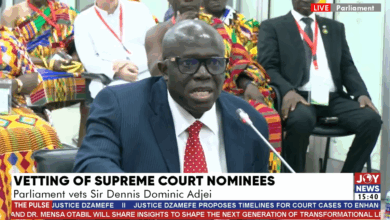The Fight Against Corruption, Misappropriation of Funds, and Causing Financial Loss to the State: Why Wait for the Next Public Accounts Committee Sitting? The Role of Stakeholders!

ACCRA — Corruption and other economic crimes undeniably impede national development, erode public trust, and promote illicit enrichment of public officials who, through the confidence of appointing authorities, are entrusted with public office. This downturn has led to the implementation of several anti-corruption measures. Despite these efforts, the issue continues to persist year after year.
The Public Accounts Committee (PAC), which is the Parliamentary Committee responsible for examining government expenditure and ensuring that public funds are used effectively and efficiently, sits at the end of every financial year to review the findings of the Auditor-General on the activities of Ministries, Departments, and Agencies (MDAs) implicated in financial irregularities.
The fight against corruption, misappropriation of funds, and causing financial loss to the state requires a multi-pronged approach — combining robust legal frameworks, strong institutional oversight and collaboration, effective law enforcement, and public awareness campaigns.
For the year ending December 31, 2024, the Auditor-General’s Report revealed persistent misuse of public funds. President John Dramani Mahama described the revelations at the PAC hearings as “pathetic”, expressing frustration over the recurring recklessness in managing state resources. He has since called on the Chief Justice, Attorney-General, and other key stakeholders to find a “final solution” to these recurring mismanagement issues.
The Role of the Attorney-General’s Office
The Attorney-General’s (AG’s) office raised serious concerns regarding the prosecution of suspects involved in economic and financial crimes, asset tracking, and recovery efforts. The AG’s office has begun working across the executive and legislature to prevent future occurrences, including amending the Public Financial Management Act to strengthen enforcement and recovery mechanisms.
The Role of Financial Sector Regulators
Financial sector regulators — including the Bank of Ghana, the Securities and Exchange Commission (SEC), and the National Insurance Commission (NIC) — must enhance inspections of MDAs, public officials, and their close associates.
- The Bank of Ghana could uncover irregularities in the bank accounts of public officials.
- The SEC and NIC could track stolen funds invested in securities and insurance policies.
The Role of Financial Institutions
1. Know Your Customer (KYC), Customer Due Diligence (CDD), and Politically Exposed Persons (PEPs)
KYC, CDD, and PEPs procedures form a critical part of compliance frameworks against corruption and financial crimes.
- KYC involves verifying a customer’s identity, typically using photo identification.
- CDD assesses customer risk and transaction patterns.
- PEPs include individuals in public positions, their spouses, and close associates, who require enhanced monitoring due to their potential risk of corruption or misuse of power.
2. Continuous Monitoring of Transactions
Financial institutions must implement real-time monitoring to detect irregularities and suspicious patterns such as money laundering. This enables proactive reporting of anomalies to the Financial Intelligence Centre (FIC) — the sole institution mandated to receive and analyse suspicious transaction reports.
3. Monitoring Transfer Instructions on Public Institutions’ Accounts
Monitoring transfer instructions from public institutions’ accounts is crucial. Banks must report suspicious transfers and may face sanctions if they fail to act.
4. Reviewing Accounts Receiving Inter/Intra-Bank Transfers
Banks are expected to periodically review accounts that receive regular transfers from public institutions to identify suspicious patterns and report them to the FIC.
5. Monitoring Employees of Financial Institutions
Banks must monitor their employees’ activities — especially those dealing with high-risk customers, including public officials. Monitoring helps prevent conflicts of interest, unauthorised transactions, and concealment of suspicious activity.
6. Reporting Suspicious Transactions
Financial institutions are legally obligated to report suspicious activities within 24 hours to the FIC after internal investigation and escalation to designated officers.
The Role of Law Enforcement Agencies
Law enforcement agencies must detect, trace, and prosecute offenses like bribery, corruption, and abuse of power. They should:
- Gather evidence and collaborate with other agencies.
- Implement robust legal frameworks.
- Cooperate with international bodies like INTERPOL, WAPIS, and the Financial Intelligence Centre to trace stolen assets and enhance transparency.
Agencies should also consider lifestyle audits and net-worth analyses for public officials implicated in financial crimes.
The Role of the General Public
The public plays a crucial role in fighting corruption through vigilance, whistleblowing, and demanding accountability. Reporting corruption, holding officials accountable, and fostering a culture of integrity and transparency are key to winning this fight.
BY RITA YEBOAH QUAYSON
Tags:
#AntiCorruption #PublicAccountsCommittee #GhanaFinance #FinancialCrimes #JohnMahama #AuditorGeneral #FinancialIntelligenceCentre #KYC #CDD #PEPs #Transparency #Accountability #Governance #PublicSector #GhanaEconomy
🔗 Follow Ghanaian Times WhatsApp Channel today. https://whatsapp.com/channel/0029VbAjG7g3gvWajUAEX12Q
🌍 Trusted News. Real Stories. Anytime, Anywhere.
✅ Join our WhatsApp Channel now! https://whatsapp.com/channel/0029VbAjG7g3gvWajUAEX12Q






